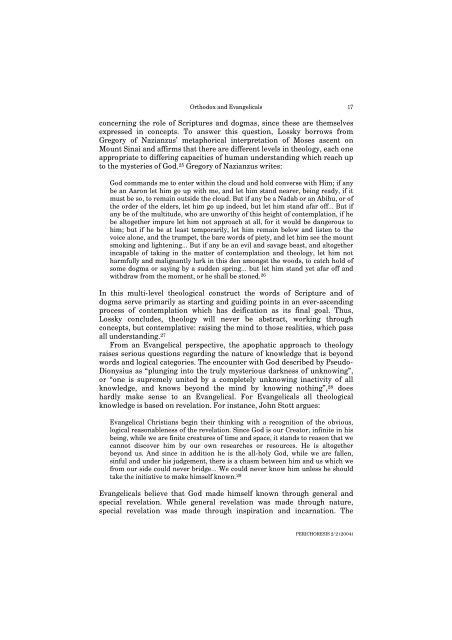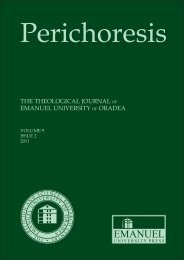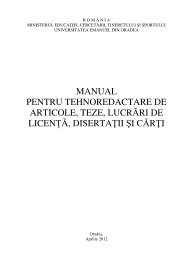Paradise Lost - Universitatea "Emanuel"
Paradise Lost - Universitatea "Emanuel"
Paradise Lost - Universitatea "Emanuel"
You also want an ePaper? Increase the reach of your titles
YUMPU automatically turns print PDFs into web optimized ePapers that Google loves.
Orthodox and Evangelicals<br />
concerning the role of Scriptures and dogmas, since these are themselves<br />
expressed in concepts. To answer this question, Lossky borrows from<br />
Gregory of Nazianzus’ metaphorical interpretation of Moses ascent on<br />
Mount Sinai and affirms that there are different levels in theology, each one<br />
appropriate to differing capacities of human understanding which reach up<br />
to the mysteries of God. 25 Gregory of Nazianzus writes:<br />
God commands me to enter within the cloud and hold converse with Him; if any<br />
be an Aaron let him go up with me, and let him stand nearer, being ready, if it<br />
must be so, to remain outside the cloud. But if any be a Nadab or an Abihu, or of<br />
the order of the elders, let him go up indeed, but let him stand afar off… But if<br />
any be of the multitude, who are unworthy of this height of contemplation, if he<br />
be altogether impure let him not approach at all, for it would be dangerous to<br />
him; but if he be at least temporarily, let him remain below and listen to the<br />
voice alone, and the trumpet, the bare words of piety, and let him see the mount<br />
smoking and lightening… But if any be an evil and savage beast, and altogether<br />
incapable of taking in the matter of contemplation and theology, let him not<br />
harmfully and malignantly lurk in this den amongst the woods, to catch hold of<br />
some dogma or saying by a sudden spring… but let him stand yet afar off and<br />
withdraw from the moment, or he shall be stoned. 26<br />
In this multi-level theological construct the words of Scripture and of<br />
dogma serve primarily as starting and guiding points in an ever-ascending<br />
process of contemplation which has deification as its final goal. Thus,<br />
Lossky concludes, theology will never be abstract, working through<br />
concepts, but contemplative: raising the mind to those realities, which pass<br />
all understanding. 27<br />
From an Evangelical perspective, the apophatic approach to theology<br />
raises serious questions regarding the nature of knowledge that is beyond<br />
words and logical categories. The encounter with God described by Pseudo-<br />
Dionysius as “plunging into the truly mysterious darkness of unknowing”,<br />
or “one is supremely united by a completely unknowing inactivity of all<br />
knowledge, and knows beyond the mind by knowing nothing”, 28 does<br />
hardly make sense to an Evangelical. For Evangelicals all theological<br />
knowledge is based on revelation. For instance, John Stott argues:<br />
Evangelical Christians begin their thinking with a recognition of the obvious,<br />
logical reasonableness of the revelation. Since God is our Creator, infinite in his<br />
being, while we are finite creatures of time and space, it stands to reason that we<br />
cannot discover him by our own researches or resources. He is altogether<br />
beyond us. And since in addition he is the all-holy God, while we are fallen,<br />
sinful and under his judgement, there is a chasm between him and us which we<br />
from our side could never bridge… We could never know him unless he should<br />
take the initiative to make himself known. 29<br />
Evangelicals believe that God made himself known through general and<br />
special revelation. While general revelation was made through nature,<br />
special revelation was made through inspiration and incarnation. The<br />
17<br />
PERICHORESIS 2/2 (2004)




